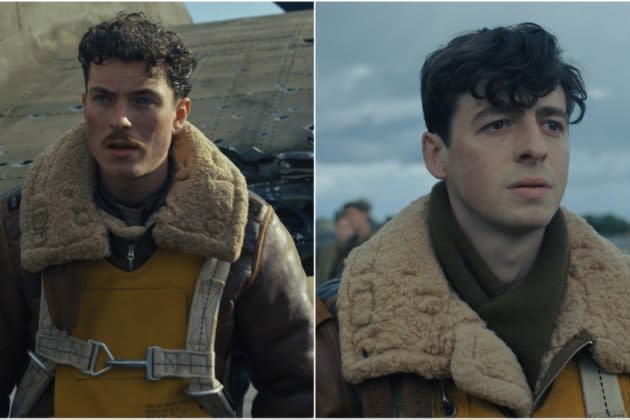Don’t Forget About: ‘Masters of the Air’ Stars Nate Mann and Anthony Boyle This Emmys Season

“Masters of the Air” doesn’t fly as high as it does without Anthony Boyle and Nate Mann. No military unit rests on the shoulders of two people, and the Eighth Air Force’s 100th Bomb Group was no different in World War II. Historically known as the Bloody 100th for the tremendous losses it endured, the fearless flyers saw some of the worst action of the war and it did so thousands of feet above the front lines.
But as a piece of cinematic storytelling, the Apple TV+ series from “Band of Brothers” trio Steven Spielberg, Tom Hanks and Gary Goetzman needs the profound warmth of Boyle’s Lt. Harry Crosby and Mann’s Major Robert “Rosie” Rosenthal to, ironically, ground its darkest days.
More from Variety
From 'We Were the Lucky Ones' to 'Masters of the Air,' Inside the Rise of World War II TV Shows
How 'Shogun,' 'The Crown' and More Dramas Pulled Off Historically Accurate Sounds
At the top of the call sheet are Austin Butler and Callum Turner, as pilots Major Gale “Buck” Cleven and Major John “Bucky” Egan, respectively. As the war and the series stretch on, Buck and Bucky find themselves behind enemy lines and far from their cockpits. With these natural-born leaders out of reach, left to rally the 100th and its war-worn men are the likes of Crosby and Rosie.
Crosby, in particular, is the first to question his ascension to leader. An endearingly skittish navigator when the series opens, Crosby comes to find his steady hand and sharp mind after being baptized by fire in early missions.
“Crosby was a bag of nerves, and he didn’t expect the adulation,” says Boyle, who also narrates the series. “But that’s the thing about bravery — being afraid and doing it anyway. That’s the definition of Crosby’s story. He still went back up in those tin cans. He was a real hero.”
Rosie arrives in Episode 4 with his own crew after a deadly mission leaves the 100th’s ranks in need of replenishing. “He’s equal parts generous and calmin-a-storm badass, two things I aspire to,” Mann says.
Unlike Crosby, Rosie more easily musters the confidence of a leader right out of the gate, but the war will test that fortitude.
Some of his first missions with the 100th change everything Rosie knows about what it takes to keep going back in the air.
“There is a bodily resistance to doing something like that for all these men,” Mann says. “That’s what I tried to find in him. You might be going through the motions to get back in that plane, but the body is kind of wiser to resist it after an experience like that. Once he finds that strength in the latter half, we see he does it for his men.”
For all the men looking to them in the 100th, not to mention the audience, Crosby and Rosie become a lifeline as the war rages on. Familiar faces are lost in an instant, only to be replaced by new, increasingly younger ones.
It means that, by the end of the series, the 100th is almost unrecognizable, and you realize just how tightly you’ve clung to the stabilizing forces of Boyle and Mann. The actors understood the responsibility, working with writer John Orloff to bring in things they learned about their real-life counterparts from memoirs and archival footage to ensure the humanity at stake in war isn’t lost in the scope of it.
They also consciously infused some of Crosby and Rosie’s later moments with something that has gotten many soldiers through the darkness — gallows humor.
“These men used humor to counteract the severity of the loss and pain,” Boyle says. “So, Nate and I thought it would be good if we could make each other laugh and make it feel as lived in as possible.”
Best of Variety
Sign up for Variety’s Newsletter. For the latest news, follow us on Facebook, Twitter, and Instagram.

